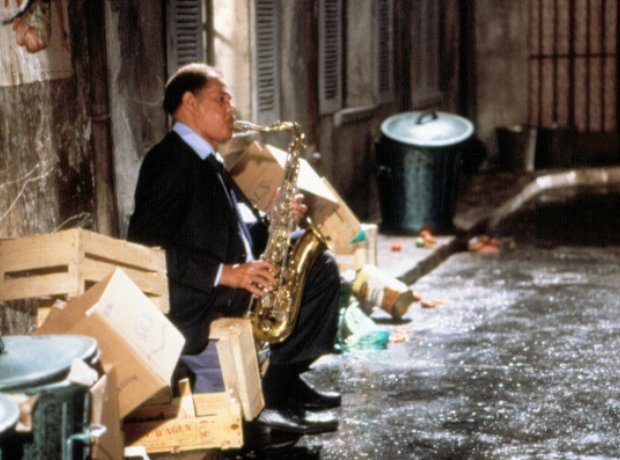Check this out: In her first of four days of programs celebrating the life and legacy of the late great jazz saxophonist Dexter Gordon, Maxine Gordon — Dexter’s wife, long-time manager and biographer — joins forces with UW Jazz Studies Professor Johannes Wallmann’s student ensemble (Blue Note Ensemble) in a concert of Dexter’s music interspersed with interview segments conducted by WORT jazz hosts Steve Braunginn and Jane Reynolds and a Q&A with the audience. Presented by the Greater Madison Jazz Consortium. For the complete schedule of Maxine Gordon’s four-day Madison residency, visit www.greatermadisonjazzcons
What makes this special for me is my last vivid memory of Dexter Gordon. I saw him live several times, and he was never less than fabulous, with his patented art of sashaying behind the beat, and his witty melodiousness. But I’ll never forget the first time I saw Bertrand Tavernier’s Round Midnight.
There’s not many films I can say that about, but this one was filled with exquisite, swinging and joyous jazz music. Yet I walked away from the theater feeling quite sad and reflective, which I think was director’s intended effect.
It’s a deeply moving film with great performances from all of the mighty musicians involved. And jazz musician Dexter Gordon’s acting performance in the lead role is astonishing. He was already dying at the time and, of course, hardly a trained actor. But then, he always had uncommon grace and eloquence in front of a concert or club crowd, so it shouldn’t surprise. Best jazz movie ever? Among scripted dramas, I’d say yes.

Dexter Gordon in a scene from “Round Midnight.”
If you’re in the Madison area you can see the Dexter @ 90 event at the Chazen Museum on Tuesday night and then again Wednesday at the Madison Urban league. But you can rent the movie any time, and I don’t think you’ll be disappointed.
Gordon plays a fictional jazz musician in Paris, loosely based on the last days of the great bebop jazz pioneer Bud Powell. Tavernier himself plays a jazz fan who befriends the magisterial and coolly magnanimous saxophone idol.
There’s not a lot of plot to it. Rather you get more of a forlorn meditation on the jazz life. The film’s very existence underscores one of the profound ironies of that life. These purveyors of an original American art form remain the proverbial prophets without honor in their own land. The jazz musicians are comfortable enough by now in their expatriate living places that you see the great vibist Bobby Hutcherson cooking away almost contentedly on his single-burner stove in a tiny Paris apartment.
Yet somehow the heavy sway in Dale Turner’s long stride stride conveys the dejection of decades of comparative rejection in one’s own homeland. I’m speaking here of the demeanor of the musician/actor – Dexter Gordon. In real life, Gordon was welcomed back to clubs and concerts when he came to visit the States.
But he could not make an honorable living in his own country so he lived in Europe through most of his career. And he was among the music’s three or four greatest living tenor saxophonist during his lifetime.
I sure hope the UW orchestra doing Gordon’s music in Madison plays “Chan’s Song” from Round Midnight. In the film, Gordon plays it uncharacteristically on soprano saxophone. I believe it was written and performed for his daughter Chan. Here you hear the depths and tenderness of the man in a superbly lyrical melody and performance. It’s my most immediate single memory of Dexter, along with the movie’s image of him sitting on a stone fence along the Seine River, slumping over…


Kevin,
Thanks for letting me know about Maxine Gordon’s appearance in Madison. It reminded me of a small story about her character and a reminder of the gift that she gave to Milwaukee.
Maxine Gordon was the main architect of Dexter Gordon, Woody Shaw and Johnny Griffin’s return to the US from their self imposed exile.
Dexter’s return to the US was a huge event in the Jazz world. He recorded and made a successful tour of major US concert halls. Later the word was out that he planned to make a limited jazz club tour. I decided to meet with Maxine to convince her to book Dexter into the Milwaukee Jazz Gallery, I arranged to meet with her in her NY city office
My problem in booking Dexter was that the amount of money he was getting was much much higher than the amount I was able to guarantee. At the end of a warm meeting Maxine told me that she had heard about the club and was convinced of it’s sincerity. She made a radical proposal to book Dexter into the the club for the union minimum amount of money (an unbelievably small amount), plus…. a major percentage of the money from the door. The concert turned out to be a huge artistic success. I ended up paying Dexter more than his usual fee and the club also made money . A rare success and a rare example of faith on Mazine’s part
Maxine later booked Woody Shaw and Johnny Griffin into the club.
Chuck LaPaglia
Former owner of the Milwaukee Jazz Gallery.
Chuck,
Thanks for the great story about Maxine and Dexter. I never heard that one.
It speaks volumes about Maxine and Dex, and about the Milwaukee Jazz Gallery. A salute to the Gallery and to you, the founder and owner.
Kevin
BTW Chuck, being in the Bay area, you might want to check out the previous post on the recently deceased Bill Bennett, oboist with the SF Symphony.